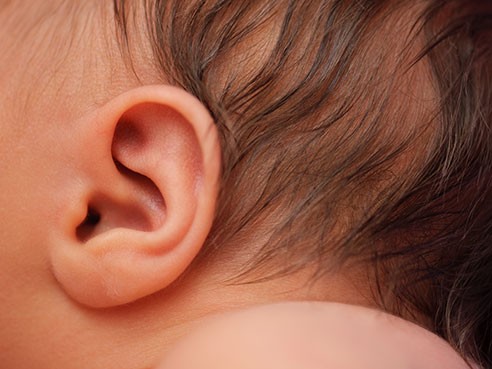Babies treated for symptomatic cytomegalovirus (CMV) infection for six months, instead of the standard six weeks, have better hearing and developmental outcomes, according to a new study from the University of Alabama at Birmingham.
One in 150 babies will be born with CMV, and about one of every five of those children will develop permanent hearing loss or have developmental disabilities, according to theCenters for Disease Control and Prevention. CMV is the most common infection passed from a mother to her unborn child, and there is no vaccine or cure for it.
David Kimberlin, M.D., professor and co-director of the UAB Division of Pediatric Infectious Diseases atChildren’s of Alabama and president of the Pediatric Infectious Diseases Society, and colleagues from about 30 other academic medical centers report that babies treated with oral valganciclovir for six months show a threefold increase in hearing and improved language development according to the Bayley Scales of Infant and Toddler Development test.
The findings are published in the March 4 issue of the New England Journal of Medicine.
This study builds on previous findings from the UAB-led Collaborative Antiviral Study Group that in the 1990s showed hearing benefits in babies treated with intravenous ganciclovir for six weeks. However, those benefits began to wane after a period of one to two years.
“In the original study, there was some indication of slippage of the hearing benefit over time,” Kimberlin said. “We were very pleased to find that hearing improvements were extended up to 24 months with the longer treatment period studied in this new trial.”
Kimberlin says advancements in knowledge of treating chronic viral diseases and infections, as well as an evolution in the thinking of how some viral diseases are best managed with longer treatment, led the investigators to increase the treatment period.
“Congenital CMV has a big impact on families, and not a week goes by that I or one of my colleagues on the study is asked by physicians and parents about helping babies with this disease,” Kimberlin said. “It’s an area where there’s a lot of need, so I was happy that the study extended our knowledge of how to manage these babies.”
Kimberlin says the next study of treatment of congenital CMV is about to begin. It will evaluate whether starting treatment beyond one month of age in patients with CMV-associated hearing loss, as compared to the current standard of beginning treatment in the first month of life, leads to improved outcomes.


